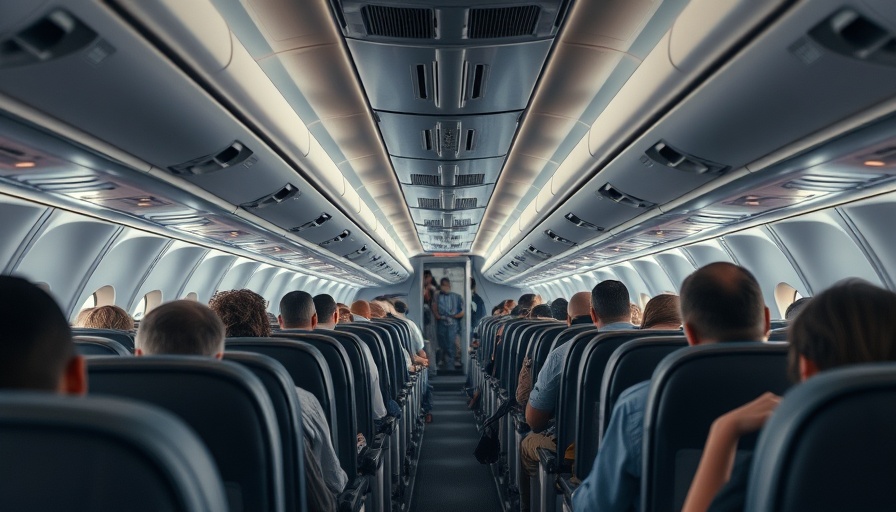
The Controversy Surrounding 'Windowless Window Seats'
In a surprising turn of events, two major airlines, Delta Air Lines and United Airlines, are facing class-action lawsuits over their advertising and sale of 'window seats' that, in truth, lack windows. This legal dispute arises from complaints that these airlines charged hefty fees for seats that offered no view whatsoever, leading several passengers to question if they truly received what they paid for. The lawsuits have been initiated in federal courts and reflect a growing frustration among consumers regarding transparency in airline seat selections.
The Value of Transparency in Airline Bookings
The crux of the issue lies in customer expectations versus reality. When a passenger selects a 'window seat', it is often for emotional or practical reasons—whether to ease anxiety, entertain children, enjoy natural light, or to have a view of the world below. The lawsuits amplifying claims that passengers were misled suggest a significant breach of trust. It raises essential questions about how airlines represent their product offerings and the ethical implications of these practices. Consumers have the right to make informed decisions, especially when they are paying extra.
Delving into the Legal Ramifications
As the complaints wind their way through the judicial system, it’s crucial to understand the implications of such legal actions on the broader airline industry. If successful, this could set a precedent that compels airlines to be more transparent about the features of their seats and the policies tied to them. The cases exemplify a larger trend where consumers are leveraging the legal system to challenge seemingly minor grievances that resonate on a broader scale.
Significance of Consumer Advocacy in Air Travel
The lawsuits are led by individuals who felt disconnected from a corporate behemoth that seemingly disregarded their rights as consumers. This sense of disenfranchisement is not unique to these cases; it permeates many aspects of consumer interactions with large corporations. As a seasoned consumer advocate, I encourage readers to express their grievances and pursue clarity when faced with similar situations, whether in air travel or any other consumer transactions. Knowledge is power, and staying informed can lead to greater accountability.
Both Airlines' Responses: An Industry in Flux
So far, the responses from Delta and United have been muted, reflecting the delicate balance they must maintain between customer satisfaction and operational logistics. While they argue the availability of third-party resources such as SeatGuru diminishes their responsibility, the legal arguments indicate growing consumer expectations for direct transparence. The failure to flag windowless seats during booking admits to potential negligence that could result in ramifications far beyond monetary damages.
How This Might Affect Travelers Moving Forward
For frequent travelers and occasional flyers alike, watching these cases unfold will be crucial. Should either airline be found liable, we can expect changes in how airlines market their seating options, potentially leading to clearer, more comprehensive disclosures regarding seat specifications. New regulations might emerge, enhancing consumer protections and accountability within the aviation industry.
What Should Passengers Do?
In light of these developments, it’s essential for consumers to stay informed. When booking a flight, passengers should verify the details of their selected seats through multiple platforms, and do not hesitate to reach out to customer service if something seems off. Additionally, it's beneficial to adopt a mindset of vigilant advocacy when engaging with companies: holding them accountable for ensuring transparency and ethical practices. By sharing experiences, consumers can alert others to potential pitfalls in the airline booking process.
Conclusion: The Value of Vigilance
This ongoing saga between airlines and customers emphasizes a significant lesson for consumers: always be vigilant and informed about your purchases. Transparency is essential in ensuring satisfaction and trust, especially in the service industry where discrepancies can often lead to dissatisfaction. As these lawsuits proceed, we recommend all passengers scrutinize their flight choices, seek clarification when necessary, and advocate for their rights in every transaction. Knowledge of the claims process, from payment justifications to potential claim debates, could be invaluable in navigating future travels. At the end of the day, a well-informed customer is the best safeguard against corporate misrepresentation.
 Add Row
Add Row  Add
Add 




Write A Comment